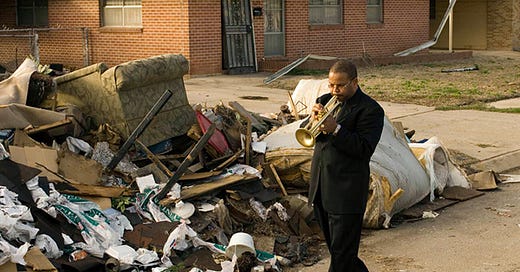Heroes of the Zeroes: When the Levees Broke: A Requiem in Four Acts
Heroes of the Zeroes is a daily, alphabetical look back at the 365 best films of 2000-2009.
"When the Levees Broke: A Requiem in Four Acts" Not Rated 2o06
Astonishingly thorough, poignant and unsentimental, 2006’s “When the Levees Broke: A Requiem in Four Acts” should be required viewing for all Americans.
Spike Lee’s documentary about Hurricane Katrina’s indelible impact on the entire nation placed him beside Jonathan Demme, Oliver Stone and Martin Scorsese as American filmmakers who can effortlessly excel as much at true-life cinema as fascinating fiction.
The scope of “Levees” affords precious little thematic repetition — civil engineering, urban planning, meteorology, public policy, journalism, jazz, insurance, business, politics, gentrification and bureaucracy. It’s exhaustively encyclopedic, notching 255 minutes over four parts — roughly divided into the storm’s immediate strike, governmental response, reconstruction and recovery, and what the future holds.
This yeoman’s work (with a sequel to boot) is stuffed with biographical and ethnographical imperatives: Lee knows who writes history and worked fast, taking less than a calendar year to complete “Levees.”
Powered by a plurality of voices, “Levees” retains distinct Creole sass, flavor and attitude — an affecting flourish to talking-head presentation that tries to rub Katrina’s substantial tarnish from the fleur de lis.
Phyllis Montana LeBlanc and Jay Asevedo are among dozens of displaced, discombobulated residents — some of whom found evacuation economically unfeasible or a concession of defeat to civic pride.
Raw rescue footage tosses viewers into rising waters, fear and resignation radiating from residents’ eyes as they face death. It’s impossible to feel inured to images of corpses floating in streets for days, reminiscent of 9/11’s infamous Falling Man photographs. And one man relating his elderly mother’s death reveals no time for grief — only the swiftest reactions and respects.
That’s just the storm — the worst of which missed New Orleans, but backed a category-one behemoth into its fragile levees. In its aftermath, survivors contend with rampant crime, recurrent stress, bureaucratic bluster, impenetrable insurance verbiage and separation anxiety as “refugee” family members are scattered in a relocation, which threatens the city’s cultural identity and idiosyncrasy.
Local-artist luminaries like Wendell Pierce (“The Wire”) and Terence Blanchard (whose mournful score provides this requiem’s dies irae) discuss and digest destruction to their parents’ residences.
Blanchard’s mother breaks down into hyperventilating tears upon surveying row upon row of rot where houses have become husks, heirlooms have washed away and home, in all but memory, is gone.
Don’t get anyone started on FEMA, considered more profane than another oft-slung four-letter word starting with “F” — especially New Orleans Mayor Ray Nagin, who cuts through PC BS with a clear-cut rage about the federal response.
“Levees” feels more forgiving of local-government limitations than the federal government’s lead-footed reaction — the insult to injury being George W. Bush and company’s complete inability to realize that their bumbling inaction represented a universal embarrassment.
There’s no way to truly distill the descriptive triumph of “Levees” down into a handful of words. The ghosts of so many color the corners of a film that’s pissed off, hopeful, practical and empathetic. A poem, a prayer and one of the most important documentaries ever made, “Levees” truly imparts what it means to miss New Orleans.



